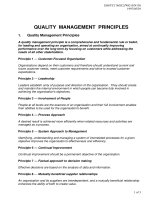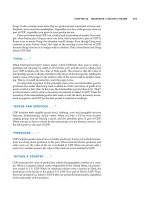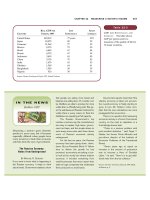Principles Ray Dalio
Bạn đang xem bản rút gọn của tài liệu. Xem và tải ngay bản đầy đủ của tài liệu tại đây (311.98 KB, 1 trang )
Insights from Principles by Ray Dalio
Ray Dalio’s philosophy in life and business, is PAIN + REFLECTION = PROGRESS.
“Just as long‐distance runners push through pain to experience the pleasure of “runner’s high,” I have largely gotten past the pain of my
mistake making and instead enjoy the pleasure that comes with learning from it.” ‐ Ray Dalio
Pain is the signal that there is a gap in your knowledge, and you have the opportunity to learn a principle to solve similar problems and
avoid similar failures. Don’t run from pain. It’s nature’s way of telling you it’s time to learn, grow, and be prepared for the future.
“Whatever success I’ve had in life has had more to do with my knowing how to deal with my not knowing than anything I know. The most
important thing I learned is an approach to life based on principles that helps me find out what’s true and what to do about it.” ‐ Ray Dalio
Here is a 3‐Part Process for adopting a principled approach to life:
PART ONE: Be Radically Open‐minded
“If you can recognize that you have blind spots and open‐mindedly consider the possibility that others might see
something better than you—and that the threats and opportunities they are trying to point out really exist—
you are more likely to make good decisions.” – Ray Dalio
When you adopt a mindset of radical open‐mindedness, you genuinely want to hear others’ honest opinions of
you. You want to know how badly you’re failing, how flawed your thinking is, or how weak your skills are.
You ask questions like “How might I be wrong?” and “How can I get more honest feedback?”
Opening yourself up to critical feedback is painful. But by letting the pain pass and putting your ego aside, you can find truth in people’s
opinions and use it to get better.
“Learning to be radically transparent is like learning to speak in public: While it’s initially awkward, the more you do it, the more
comfortable you will be with it.” – Ray Dalio
PART TWO: Find the Root Cause
“Distinguish proximate causes from root causes. Proximate causes are typically the actions (or lack of actions)
that lead to problems, so they are described with verbs (I missed the train because I didn’t check the train
schedule). Root causes run much deeper and they are typically described with adjectives (I didn’t check the train
schedule because I am forgetful).” – Ray Dalio
I often experience the pain of failing to show up on time for important events. While I frequently blame
external factors like traffic, the truth is I lose track of time. I don’t properly factor in the time to get to my
appointments.
Finding the root cause often leads to a personal weakness. However, you don’t need to feel ashamed and surrender to your weaknesses –
you can find principles to overcome them.
You can find principles to build a system that works around your weakness (ex: I developed a system of putting every event in my calendar
with two default alerts so I am less likely to lose track of time), learn principles to build a new skill and eliminate the weakness, or
outsource the weakness in one area of your life to someone who has a strength in that area.
PART THREE: Write Your Principles Down
"To be principled means to consistently operate with principles that can be clearly explained." – Ray Dalio
The easiest way to develop principles you can clearly explain is to write them down and refine them.
I often refer to my set of ‘book summary principles’ – a Google Doc of the most effective methods for
deconstructing a book and creating these summaries. I’ve found that having my principles written down has
allowed the process of summarizing a book to get progressively smoother.
“My hope is that reading this book will prompt you and others to discover your own principles from wherever you think is best and ideally
write them down. Doing that will allow you and others to be clear about what your principles are and understand each other better. It will
allow you to refine them as you encounter more experiences and to reflect on them, which will help you make better decisions and be better
understood.” – Ray Dalio
Nathan Lozeron
www.ProductivityGame.com









